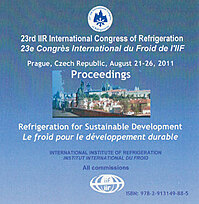
IIR document
E-education in refrigeration technologies for students and technicians in the workplace.
Number: pap. ID: 262
Author(s) : LENAERTS M., SCHREURS M., REULENS W.
Summary
The demand for broadly educated engineers, installers and service technicians is growing because of the strong growth in refrigeration, air conditioning and heating. The rapid technological evolution makes it impossible for a school or training centre to invest in all HVAC and refrigeration fields. It is here that elearning, blended learning and virtual labs provide the answer. Students and course participants need new forms of learning where the course materials are available anytime, anywhere and are adapted to the needs and prior knowledge of each individual student. This is why in 2004 we started with the development of e-learning courses, which are all hosted on an open-source learning management system. Seven years later we have 30 interactive e-learning courses on cooling, heating and air conditioning, ranging from the basics to the latest technologies and systems. We are still developing new ones to keep up-to-date with the latest evolutions. But education is more than just gaining theoretical knowledge. Our blended learning modules unite the theoretical and the practical aspects of education, by combining e-learning with practical sessions in our labs. Each student or course participant that uses blended learning does not only benefit from the many advantages of e-learning, but can also gain practical experience this way. By integrating e-learning in virtual reality we created virtual labs. We made 3D models of our labs complete with installations and equipment using 3D modeling software. Instead of looking at an image of an installation inside the e-learning course, a course participant can now walk around in our labs, walk up to an installation and look at real-time data from the actual installation itself. Or go into a virtual classroom and take an e-learning course. One of the European funded projects we are currently participating in is the Real-Skills-Europe project. The goal of the project is to achieve reductions in refrigerant leakage through improved awareness, education and training. The consortium comprises educational institutions, teaching, membership and research organizations from 6 European countries, which perform leading roles in their own countries in training and supporting RAC professionals, research and innovation. This project shows perfectly how e-education is indispensable for the training of students and technicians in the workplace.
Available documents
Format PDF
Pages: 7 p.
Available
Public price
20 €
Member price*
Free
* Best rate depending on membership category (see the detailed benefits of individual and corporate memberships).
Details
- Original title: E-education in refrigeration technologies for students and technicians in the workplace.
- Record ID : 30002384
- Languages: English
- Source: Proceedings of the 23rd IIR International Congress of Refrigeration: Prague, Czech Republic, August 21-26, 2011. Overarching theme: Refrigeration for Sustainable Development.
- Publication date: 2011/08/21
Links
See other articles from the proceedings (569)
See the conference proceedings
Indexing
-
Education = efficiency: the US situation.
- Author(s) : LOWRY M.
- Date : 2009/06/12
- Languages : English
- Source: Latest technologies in refrigeration and air conditioning: energy issues and climate change, new refrigerants, new European regulations, new plants, the cold chain. XIII European Conference: June 12-13, 2009, Milan.
- Formats : PDF
View record
-
Modelling and control of refrigeration systems ...
- Author(s) : DUARTE R.
- Date : 2016/05/03
- Languages : English
- Source: CYTEF 2016. VIII Congreso Ibérico y VI Congreso Iberoamericano de las Ciencias y Técnicas del Frío, Coimbra-Portugal, 3-6 mayo, 2016.
- Formats : PDF
View record
-
La formation des adultes en europe : euroqualif...
- Author(s) : GIRAUD-HERAUD C.
- Date : 1994/11/21
- Languages : French
- Source: 2nd European refrigeration forum. Discussion on substitute refrigerants at the eve of 1995. Conferences./ 2e Forum européen du froid. Le point sur les fluides frigorigènes de remplacement à la veille de 1995. Conférences.
View record
-
L'Association Suisse du Froid au service des mé...
- Author(s) : BRUGGMANN R.
- Date : 1998/11/11
- Languages : French
- Source: 9e Y-Symposium Froid. Résumé des conférences.
View record
-
Les formations diplomantes proposées par le Con...
- Date : 1999/11/10
- Languages : French
- Source: La trigénération. Recueil des conférences.
View record
